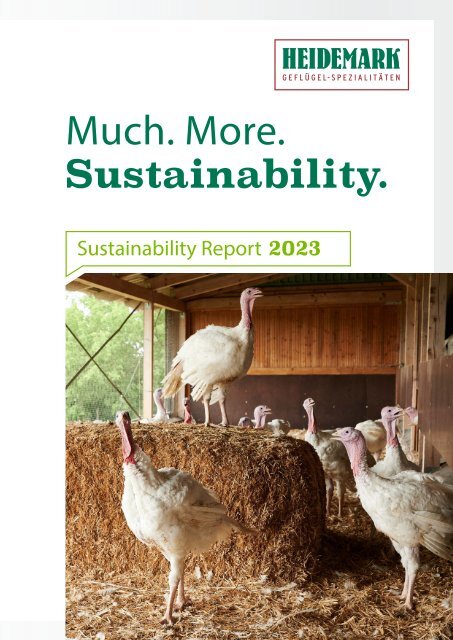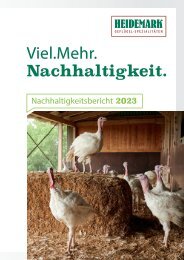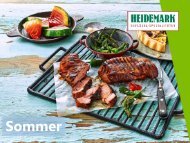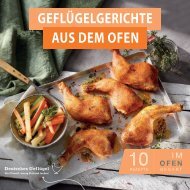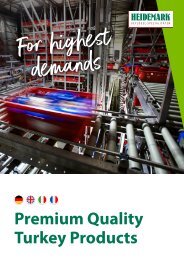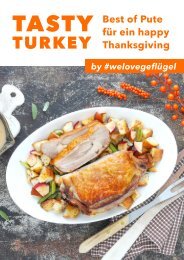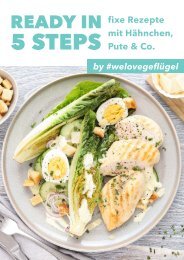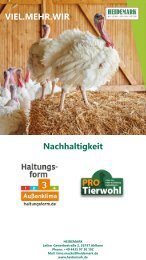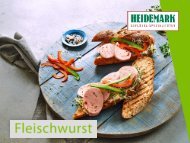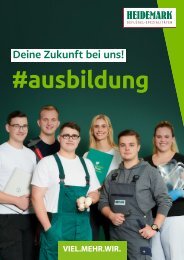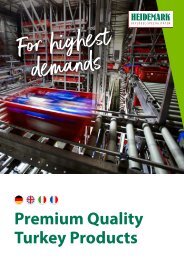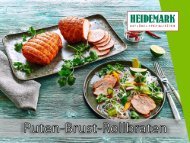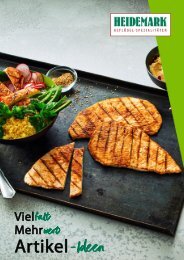Much.More.Sustainability - Sustainability Report 2023
You also want an ePaper? Increase the reach of your titles
YUMPU automatically turns print PDFs into web optimized ePapers that Google loves.
<strong>Much</strong>. <strong>More</strong>.<br />
<strong>Sustainability</strong>.<br />
<strong>Sustainability</strong> <strong>Report</strong> <strong>2023</strong>
01.<br />
1.1 Company 08<br />
1.2 Facts & figures 10<br />
1.3 Mission statement 12<br />
1.4 Stakeholder dialogue 14<br />
1.5 Materiality matrix 16<br />
Company<br />
02.<br />
Economy<br />
2.1 Value chain 20<br />
2.2 Quality 22<br />
2.3 Innovation & research 24<br />
A different, more expressive image –<br />
Jamie will upload some more for me<br />
here<br />
03.<br />
Animal welfare<br />
3.1 Husbandry systems 28<br />
3.2 Indicators 30<br />
3.3 Loading 31<br />
04.<br />
Ecology<br />
4.1 Climate & energy 34<br />
4.2 Water 36<br />
4.3 Packaging 38<br />
4.4 Waste 39<br />
4.5 Biodiversity 40<br />
05.<br />
Social responsibility<br />
5.1 Employees 44<br />
5.2 Personnel development 46<br />
5.3 Occupational health<br />
& safety 47<br />
5.4 Regional commitments 48
HEIDEMARK<br />
INTRODUCTION<br />
4 SUSTAINABILITY REPORT <strong>2023</strong><br />
FOREWORD 5<br />
Dear readers,<br />
As a third-generation family business, we can look<br />
back on over 50 years of commercial operations.<br />
The four dimensions of sustainability – economy,<br />
animal welfare, ecology and social responsibility –<br />
have a significant impact on our poultry farming,<br />
slaughtering, fabrication, processing and logistics<br />
business areas. To date, we have been able to<br />
ensure and create a sustainable future for turkey<br />
husbandry by always incorporating these four dimensions.<br />
We have a responsibility to use the resources available<br />
to us sparingly along our entire value chain.<br />
<strong>Sustainability</strong> affects us all, and in all areas of life.<br />
Our company’s strategy is to use renewable energy,<br />
digitalise entire areas of the business and thus<br />
become faster and less error-prone, while continuing<br />
to use sustainable packaging. These are just<br />
a few examples of a more conscious use of scarce<br />
resources.<br />
Being a family entrepreneur,<br />
a very approachable and direct<br />
corporate culture is important<br />
to me.<br />
Our doors are always open, so that all issues can<br />
be addressed directly. Close ties with our employees,<br />
a friendly and informal culture, and strong<br />
engagement with our customers, suppliers, and<br />
especially the farmers are extremely important to<br />
me. The transformation of the job market into an<br />
employee-centric market is also making it increasingly<br />
challenging for us to find new employees<br />
and retain them for long periods within the company.<br />
Therefore, we strive every day to become<br />
a little better in this area. These efforts make us<br />
more attractive as an employer and secure jobs in<br />
our region. We give people of all nationalities and<br />
ages good prospects and a secure job.<br />
In recent years, outbreaks of avian influenza (bird<br />
flu) have had a severe impact on our business activities.<br />
Unfortunately, this has almost become a<br />
major year-round issue. Once a seasonal occurrence<br />
in autumn and winter, it has now become<br />
endemic and shows little respite even during<br />
the summer months. We are therefore working<br />
hard to make vaccination programmes possible<br />
throughout the European Union. Last winter, the<br />
Federal Ministry of Agriculture presented a policy<br />
paper outlining the planned future of turkey<br />
husbandry in Germany. The requirements go far<br />
above the established husbandry practices. Turkey<br />
husbandry can only continue to exist in Germany<br />
if there is a general societal acceptance of<br />
the long-established husbandry methods that are<br />
subject to the QS control system and the animal<br />
welfare initiative "Initiative Tierwohl". In recent<br />
months, therefore, we have intensified our dialogue<br />
with diverse stakeholder groups and created<br />
transparency with regard to how our turkeys<br />
are kept.<br />
Despite the challenging market conditions,<br />
we maintain a very optimistic outlook: in 2022,<br />
we successfully established labelling scheme<br />
"Haltungsform 3" and ensured consistent availability<br />
of the required products on the market. We<br />
also launched a new processing facility for con-<br />
venience products and made investments in<br />
new machinery. We are currently engaged in<br />
projects involving the use of alternative energy<br />
sources – with the goal of chieving carbon<br />
neutrality at our production facility in Ahlhorn<br />
until 2045. This sense of optimism and our<br />
ongoing work on improvement processes are<br />
already paying off for our business. Our inclusion<br />
of the four sustainability dimensions –<br />
economy, animal welfare, ecology and social<br />
responsibility – is worthwhile in all respects.<br />
Not least because it enables us to look forward<br />
with a clear conscience and offer both secure<br />
jobs and high-quality products.<br />
The progress we have already made in recent<br />
years and our plans for the coming years are<br />
explained in detail on the following pages.<br />
Enjoy reading the report!<br />
To ensure sustainable<br />
corporate develoment,<br />
we focus on expertise,<br />
high quality and<br />
reliability.<br />
Christopher Kalvelage
01.<br />
Company
HEIDEMARK<br />
1.1<br />
8 SUSTAINABILITY REPORT <strong>2023</strong><br />
COMPANY<br />
9<br />
Company<br />
At HEIDEMARK, we employ around 1,800 people<br />
and pursue the goal of creating turkey products of<br />
the highest quality.<br />
In 1965, Reinhold Kalvelage founded a feed mill<br />
in Höltinghausen. HEIDEMARK has been a 100%<br />
owner-managed family business ever since, now<br />
under the leadership of Christopher Kalvelage,<br />
who took the reins in 2015 and represents the<br />
third generation of his family.<br />
At our headquarters in Ahlhorn, we operate<br />
the largest and most efficient turkey slaughterhouse<br />
in Europe. Its annual capacity is approximately<br />
200 m kg of turkey meat with an annual<br />
turnover of € 604 m (financial year: 2022). Our core<br />
business is the rearing and transport of turkeys as<br />
well as the processing and marketing of turkey<br />
products, which are sold to food retailers and<br />
industrial customers. We operate our own parent<br />
stock farms, hatcheries and fattening farms,<br />
where around 2.7 million turkeys are reared every<br />
year. Being fully aware of our responsibilities towards<br />
our industry, we want to play our part in the<br />
development of sustainable turkey husbandry.<br />
Refrigerated<br />
lorries<br />
Live animal<br />
transport lorries<br />
51 39<br />
€ 604 m Turnover in the<br />
financial year 2021/22<br />
German industry leader with a market share of<br />
approx. 50%<br />
The slaughter volume is approx. 250<br />
m kg per year. This corresponds to<br />
approx. 14.5 m toms and hens.<br />
Financial year 2021/22<br />
Chicks marketed in the 2022 financial year<br />
approx. 16 m
HEIDEMARK<br />
1.2<br />
10 SUSTAINABILITY REPORT <strong>2023</strong><br />
FACTS & FIGURES 11<br />
Facts & figures<br />
Over<br />
1,800<br />
people<br />
from<br />
38 countries<br />
work for us<br />
80%<br />
Trainee<br />
retention rate<br />
34%<br />
Women in management<br />
positions<br />
2%<br />
Reduction in fuel consumption<br />
compared to previous year<br />
Our turkey<br />
utilisation rate is<br />
97%<br />
Water<br />
recycling rate<br />
44%<br />
20<br />
newly installed<br />
charging points<br />
15 %<br />
Energy savings since 2012<br />
Since 2020,<br />
instead of<br />
Christmas<br />
presents, we<br />
have made<br />
donations to<br />
worthy causes
HEIDEMARK<br />
1.3<br />
12 SUSTAINABILITY REPORT <strong>2023</strong><br />
MISSION STATEMENT 13<br />
Mission statement<br />
<strong>Sustainability</strong> has been a major focus at<br />
HEIDEMARK for many years. In 2015, we established<br />
our first in-house workshops in order to<br />
elaborate and consolidate key topics and develop<br />
a mission statement.<br />
Our current initiatives are designed to meet both the way in which we structure these issues and<br />
the present and future needs of our society while our approach to sustainability management.<br />
also securing our long-term business operations. Since 2018, Dr. Hanna Strüve has been responsible<br />
for all sustainability activities as head of<br />
For us, sustainability means developing sustainable<br />
turkey husbandry by taking into account animal<br />
welfare as well as economic, ecological and aging Partner, Christopher Kalvelage. In addi-<br />
a dedicated department, reporting to the Man-<br />
social factors. We also aim to contribute to the implementation<br />
of the United Nations’ Sustainable ability team was established. The team regularly<br />
tion, an eight-member interdisciplinary sustain-<br />
Development Goals (SDGs)*.<br />
meets to discuss current projects and potential<br />
In 2017, we took the decision to further improve improvements, thereby ensuring progress on the<br />
respective issues.<br />
And this work has certainly paid off: since<br />
2019, HEIDEMARK has been certified under<br />
the ZNU Standard for Sustainable Business<br />
Practices (https://www.znu-standard.com/en/).<br />
Since then, our work has been reviewed each<br />
year via external audits, making our annual performance<br />
quantifiable. Our holistic approach to<br />
sustainability (based on four dimensions) in line<br />
with the ZNU standard, as well as the integration<br />
of additional sustainability guidelines, help us to<br />
work on incremental improvements in a structured<br />
manner. In this way, we aim to ensure that<br />
our company continually evolves in the spirit of<br />
sustainability.<br />
To this end, we make sure all employees get<br />
involved in these efforts by providing training<br />
for new staff and teaching our trainees to act as<br />
sustainability ambassadors. Only by working together<br />
systematically can we improve our structures,<br />
methods, and processes, and continue<br />
working towards our sustainability goals.<br />
We focus our support on the following SDGs*:<br />
2<br />
3<br />
4<br />
6<br />
7<br />
8<br />
12<br />
17<br />
Zero hunger<br />
Good health and well-being<br />
Quality education<br />
Clean water and sanitation<br />
Affordable and clean energy<br />
Decent work and economic growth<br />
Responsible consumption and production<br />
Partnerships for the goals<br />
*All 17 SDGs can be found at: https://sdgs.un.org/goals
14<br />
HEIDEMARK<br />
SUSTAINABILITY REPORT <strong>2023</strong><br />
1.4<br />
STAKEHOLDER DIALOGUE<br />
15<br />
Stakeholder dialogue<br />
Internal and external communication is a key element<br />
of our business – it is the only way we can increase the<br />
acceptance of our commercial activities and, at the<br />
same time, recognise emerging trends.<br />
We attach great importance to maintaining a view every step of the slaughter and fabrication<br />
constant dialogue with our stakeholders. Given<br />
that companies are required to interact with during ongoing operations. The separated aisle<br />
process from our transparent visitor walkway<br />
numerous and diverse internal and external allows production to continue unhindered and<br />
stakeholders, whereby each group has specific also enables us to safeguard our operational<br />
expectations and demands, our sustainability hygiene standards.<br />
team has identified the key stakeholder groups<br />
in relation to our company, along with their In collaboration with WING (Science and Innovation<br />
for Sustainable Poultry Production) in<br />
respective interests, risks, opportunities and<br />
potential solutions. We have incorporated the Vechta, a branch of TiHo Hannover (University<br />
results into our materiality matrix and derived of Veterinary Medicine Hannover Foundation),<br />
corresponding targets and measures.<br />
we focus on sharing knowledge, especially for<br />
the benefit of school pupils, by providing objective<br />
and scientifically-grounded insights into<br />
Over the last two years, we<br />
have worked hard to expand poultry farming. Barn visits allow us to directly<br />
our internal and external demonstrate how turkeys are kept. Furthermore,<br />
we consider regular discussions with an-<br />
communications.<br />
imal protection organisations to be important.<br />
To this end, we have not only expanded our Only through dialogue can we establish understanding<br />
and demonstrate what humane live-<br />
communications team, but also attend numerous<br />
job fairs and report internally on sustainability<br />
issues via newsletters. This year, we have To maintain an ongoing dialogue and further<br />
stock husbandry looks like.<br />
also improved communication with our production<br />
employees by introducing an employtively<br />
participate in 25 diverse working groups<br />
the development of turkey husbandry, we acee<br />
app, which is available in various languages. and are consistently prepared to engage in collaborative<br />
research in our test stables.<br />
To give visitors some insights into turkey husbandry<br />
and processing, they are welcome to<br />
Authorities<br />
Neighbours<br />
NGOs<br />
Trade<br />
Suppliers<br />
Employees<br />
Business<br />
owners<br />
Farmers<br />
Consumers<br />
We attach great<br />
importance to maintaining a constant<br />
dialogue with our stakeholders.
HEIDEMARK<br />
1.5<br />
16 SUSTAINABILITY REPORT <strong>2023</strong><br />
MATERIALITY MATRIX 17<br />
4<br />
Materiality<br />
matrix<br />
Reduce the economic risk for farmers<br />
Food safety<br />
High success rate & hygiene standards<br />
Employees’ sense of<br />
identity & belonging<br />
Waste<br />
Internal<br />
communication<br />
Packaging<br />
Innovation &<br />
product variety<br />
Proof of origin<br />
Professional leadership<br />
Purchase & sales price<br />
Product quality<br />
Climate<br />
Appreciating employees<br />
Fair payment<br />
Reconciliation of family & career<br />
Animal welfare & health<br />
Sustainable migration<br />
Shortage of skilled workers<br />
Respect for the animal<br />
Feed<br />
The purpose of our materiality matrix is to illustrate<br />
the impact of our business activities on sustainability<br />
issues (inside-out perspective) and, conversely,<br />
the significant impact of sustainability issues on<br />
our business activities (outside-in perspective).<br />
In this way, we aim to create transparency in our<br />
business activities vis-à-vis our internal and external<br />
stakeholders. We use retrospective information<br />
to identify issues affecting our operations, and<br />
predictive data to highlight future developments<br />
for which we have a growing need to prepare.<br />
By referring to the materiality matrix, we can identify<br />
genuinely important sustainability topics and<br />
queries, thereby engaging in relevant dialogue with<br />
our stakeholder groups. Only through an honest and<br />
fact-based discourse can we work together every day<br />
to gradually improve all aspects of turkey husbandry.<br />
3<br />
Appreciation for the farmers<br />
Addition of phosphorous / antibiotics<br />
Emissions: odour & noise<br />
Transport & slaughter<br />
Temporary<br />
delivery<br />
problems<br />
Price/performance<br />
ratio<br />
Water consumption & industrial<br />
water treatment<br />
Economic security<br />
The X axis shows the importance of our business<br />
activities for HEIDEMARK and the Y axis their importance<br />
for our stakeholders. Since each stakeholder<br />
group has specific needs, these were also taken into<br />
account. They are ranked in order of relevance. The<br />
top-right quadrant represents the issues that are most<br />
important to us. These sustainability issues are not only<br />
of special significance for us, but are also considered<br />
extremely important by our stakeholders. These key<br />
topics are underpinned by our sustainability goals. In<br />
concrete terms: we need to work on these issues<br />
every day.<br />
Relevance from a stakeholder perspective<br />
Discrepancy between animal welfare &<br />
BauGB (German federal building code)<br />
Respect for human rights<br />
Herbs & spices<br />
Traffic<br />
Company doctor<br />
Competitiveness<br />
Image/scandals/<br />
legal infringements<br />
Driver training / HGV safety technology<br />
The materiality matrix is updated annually by<br />
our sustainability team. It is also updated to<br />
reflect significant changes in the law.<br />
Relevance:<br />
1<br />
2<br />
3<br />
low<br />
Economic economy<br />
medium Animal welfare<br />
high<br />
Ecology<br />
1 2 3<br />
4<br />
4<br />
very high<br />
Social responsibility<br />
Operational relevance for HEIDEMARK
02.<br />
Economy<br />
Our<br />
sustainability goals<br />
• Changeover to mono-materials<br />
in our primary packaging<br />
by the end of <strong>2023</strong><br />
• 50% reduction in the number<br />
of printers in our administrative<br />
offices by the end of 2024
HEIDEMARK<br />
2.1<br />
20 SUSTAINABILITY REPORT <strong>2023</strong><br />
VALUE CHAIN 21<br />
Value chain<br />
9<br />
8<br />
Animal husbandry<br />
Alongside processing, turkey husbandry is our<br />
10<br />
7<br />
6<br />
core competence and forms the basis for our value<br />
5<br />
chain.<br />
4<br />
11<br />
Our main suppliers are farmers in Germany, Po-<br />
are removed from the barns and brought to<br />
land, France, Belgium, Denmark, the Netherlands<br />
Ahlhorn in a special live animal transport lorry.<br />
and the Czech Republic. We stay in close contact<br />
with all of them through our local field service.<br />
Animal husbandry is divided<br />
into parent stock farms,<br />
hatcheries, and rearing and<br />
fattening farms.<br />
In parent stock farms, the hens are inseminated<br />
by the toms so that they lay fertilised eggs. The<br />
eggs are then artificially incubated in the hatchery<br />
to ensure that the chicks hatch on the 28th<br />
day. From the hatchery, the animals are transferred<br />
to special rearing and fattening barns,<br />
where they are reared for 16 to 21 weeks. The<br />
farmers are obliged buy their feed from feed<br />
mills that meet our quality standards. The content<br />
of the mixed feed is adjusted according to<br />
the age of the animals. The main ingredients for<br />
all age groups are maize, wheat and soya, which<br />
are purchased on the world market. When the<br />
A large part of our workforce is based there. The<br />
turkeys are then slaughtered and processed<br />
into meat products. The finished products are<br />
delivered to customers on the same day using<br />
our refrigerated logistics fleet.<br />
Our turkey utilisation rate is 97%. The products<br />
that are not used for food production (such as<br />
feathers and blood) are converted into processed<br />
animal proteins or into pet food. Packaging<br />
waste and other waste materials are recycled<br />
as far as possible. Our entire value chain<br />
is certified under the QS standard. Neutral<br />
external inspections take place at all stages of<br />
production. These external inspections, as well<br />
as our own daily checks that form part of our<br />
quality management system, guarantee that<br />
we deliver safe products to our customers. We<br />
market our products primarily to national and<br />
international food retailers, and also to industrial<br />
customers, which process our products.<br />
20<br />
19<br />
17<br />
12<br />
18<br />
16<br />
Customers<br />
Production<br />
13<br />
15<br />
1<br />
14<br />
2<br />
3<br />
animals have reached their final weight, they<br />
Feed<br />
Animal husbandry<br />
Production<br />
1<br />
Maize<br />
5<br />
Parent stock<br />
11<br />
Anaesthesia<br />
16<br />
Water<br />
2<br />
Soya<br />
6<br />
Hatchery<br />
12<br />
Slaughter<br />
17<br />
Wastewater treatment plant<br />
3<br />
Wheat<br />
7<br />
Rearing<br />
13<br />
Processing + packaging<br />
18<br />
Packaging materials<br />
4<br />
Feed<br />
8<br />
Fattening<br />
14<br />
Loading<br />
19<br />
Other ingredients<br />
9<br />
Manure<br />
15<br />
Refrigerated transport<br />
20<br />
Slaughterhouse waste<br />
10<br />
Live animal transport
22<br />
HEIDEMARK<br />
SUSTAINABILITY REPORT <strong>2023</strong><br />
2.2<br />
QUALITY<br />
23<br />
Quality<br />
We safeguard our processes<br />
by means of internal checks,<br />
whose results are validated<br />
via neutral external<br />
inspections. Apart from<br />
meeting the legal standards,<br />
HEIDEMARK complies with<br />
the requirements specified<br />
by several external quality<br />
assurance systems and maintains<br />
the relevant national and<br />
international certifications.<br />
Standard for Sustainable<br />
Business Practices<br />
Since 2019, our Ahlhorn location has been certified under the ZNU<br />
Standard for Sustainable Business Practices, and undergoes annual<br />
inspections by an external certification body. The ZNU standard<br />
requires and promotes the development of an integrated<br />
management system for a more sustainable business.<br />
Through systematic and joint sustainability planning, we incrementally<br />
improve our internal structures, methods and processes.<br />
Because the ZNU standard advocates for more sustainable business<br />
practices, our sustainability team is continuously challenged<br />
to gradually enhance sustainability aspects within each of our<br />
specialist departments.<br />
www.znu-standard.com/en/<br />
www.heidemark-tierwohl.de<br />
HEIDEMARK PRO Tierwohl - our own animal welfare standard<br />
Since 2022, a number of farms have gone one step further by being certified to the HEIDEMARK PRO animal welfare standard.<br />
Accordingly, they now offer their animals an outdoor climate area, considerably more space and a wider range<br />
of enrichment materials. Naturally, these farms are also certified under the QS, ITW and VLOG standards.<br />
www.heidemark-tierwohl.de<br />
Verband Lebensmittel ohne Gentechnik e.V.<br />
The HEIDEMARK farms certified by the ITW also commit to feeding their turkeys with non-genetically modified feed.<br />
At these farms, an additional inspection of the feeding process is carried out in accordance with the standard published<br />
by the German Association Food without Genetic Engineering (Verband Lebensmittel Ohne Gentechnik (VLOG)).<br />
www.ohnegentechnik.org/en<br />
Our internal quality management<br />
system regulates all<br />
requirements for processes,<br />
marketable products and also<br />
the handling of non-conforming<br />
products. Thanks to our<br />
in-house laboratory analyses<br />
we can quickly provide relevant<br />
information and steer<br />
our production processes<br />
QS – the inspection system for<br />
foodstuffs<br />
The QS system guarantees strict quality assurance across all<br />
stages of food production. Each individual stage is inspected<br />
by external certification bodies – the parent stock farms, the<br />
hatchery, the rearing and fattening farms, the feed companies, the<br />
logistics facilities, the slaughterhouse and fabrication line, all the<br />
way to the food retail counter.<br />
www.q-s.de/en<br />
Halal<br />
The feeding and slaughtering of turkeys at HEIDEMARK complies with the regulations of the Halal standard and is<br />
considered permissible in accordance with Islamic principles.<br />
www.halal-certification.de<br />
DLG – German Agricultural Society (Deutsche Landwirtschaftsgesellschaft)<br />
In 2022, we were awarded the “Long-Term Product Quality Award” by the DLG for the 14th time. This award highlights<br />
our consistent pursuit of quality and is only presented to companies whose food products have been regularly and<br />
successfully tested by the DLG for at least five years.<br />
accordingly. Our complaint<br />
statistics are analysed by<br />
an interdisciplinary team to<br />
ensure consistent, collective<br />
improvements in this area.<br />
By adhering to strict internal<br />
and external rules, we guarantee<br />
consumer protection<br />
and maximise the safety of<br />
our processes and products.<br />
ITW – Initiative Tierwohl<br />
(animal welfare initiative)<br />
This cross-sector alliance of agriculture, the meat industry and<br />
food retailers has set itself the goal of promoting animal welfare<br />
in livestock husbandry. We have been a member since its<br />
inception in 2015. The participating farms are committed to reducing<br />
the stocking density in their barns by 10% and to providing<br />
additional enrichment materials for their animals. At the same<br />
time, the ITW-certified farms must undergo even more frequent<br />
inspections.<br />
www.initiative-tierwohl.de/en<br />
BRC Global Standard<br />
The “Global Standard for Food Safety” guarantees safety and quality requirements that food producers must meet.<br />
BRC is a recognised standard, particularly in English-speaking Europe and parts of Asia.<br />
www.brcgs.com<br />
International Featured Standards<br />
This seal of quality distinguishes processes that guarantee the highest levels of food safety, hygiene and a sound<br />
operational infrastructure. It also serves as a guarantee that our customers are buying products that conform to<br />
these standards.
HEIDEMARK<br />
2.3<br />
24 SUSTAINABILITY REPORT <strong>2023</strong><br />
INNOVATION & RESEARCH 25<br />
Innovation & research<br />
As a manufacturer and supplier to the trade and<br />
As industry, a manufacturer HEIDEMARK and supplier develops to the over trade, 400 HEIDE- new<br />
MARK products develops every over year, 400 which new are products presented each to year, our<br />
which customers are presented after a product to our development customers after phase. a product<br />
development phase.<br />
technology: using individual experimental<br />
compartments we can scientifically<br />
investigate how innovations<br />
could be implemented in practice.<br />
For example, we are currently investigating<br />
ways to optimise our feed recipes<br />
with the goal of reducing our use<br />
rate with the German Research Centre<br />
for Artificial Intelligence GmbH (DFKI)<br />
and various companies to develop a<br />
mobile visual quality detection system<br />
for food, with the goal of improving<br />
the screening process. Fruits, vegetables<br />
or cuts of meat with significant<br />
We create new variations and refine our cutting<br />
techniques, with the result that we can now process<br />
almost all of the turkey – except for 3%. This<br />
forms part of our concept of sustainability. At the<br />
same time, we don’t just take current food trends<br />
into account. We also draw fresh inspiration from<br />
store checks and professional tools such as the<br />
Mintel database, which gives us global access to<br />
trends, new products and ingredients. This is important<br />
for our business since it helps us to strike<br />
a chord with consumers and lets us identify which<br />
aspects we need to focus on moving forward. Ensuring<br />
careful handling of the allocated resources<br />
is always a prerequisite. Naturally, we also ask our<br />
suppliers to participate in this process; for example,<br />
by organising annual supplier days with our<br />
(mostly regional) partners.<br />
Research conducted<br />
in our own test<br />
stables<br />
In the area of animal husbandry, we conduct<br />
research in our two test stables and carry out<br />
application observations. Whether comparing<br />
feed rations, alternative protein sources, animal<br />
genetics, enrichment materials or new housing<br />
of – or completely replacing – soya as<br />
a protein source by switching to processed<br />
animal protein.<br />
In recent years, we have already<br />
gained numerous insights via a wide<br />
range of research projects and have<br />
also brought them to the market, ensuring<br />
that many of our findings are<br />
actually implemented in practice on<br />
turkey farms.<br />
Use of artificial<br />
intelligence<br />
(AI)<br />
signs of damage or spoilage must be<br />
identified and removed from the processing<br />
cycle. This involves a complex<br />
quality control process that poses an<br />
enormous challenge for the human<br />
eye. In order to optimise this process<br />
with the help of artificial intelligence,<br />
the Movi-Q project focused on developing<br />
a mobile system for automatic<br />
quality recognition.<br />
The goal is to develop a commercially<br />
viable prototype so that the new system<br />
can subsequently be used on an industrial<br />
scale.<br />
By using artificial intelligence it is possible<br />
to significantly increase the level<br />
Product development<br />
We are also embracing AI by support-<br />
of automation in the food industry, im-<br />
ing innovative projects in this field.<br />
HEIDEMARK is currently working on<br />
the Movi-Q project (Mobile visual<br />
quality recognition through artificial<br />
intelligence for the food indus-<br />
prove food processing through better<br />
quality control and achieve more sustainable<br />
production by reducing food<br />
waste. This can also have a positive economic<br />
impact. The project is being fund-<br />
try). The German Institute of Food<br />
ed by the Federal Ministry of Food and<br />
Technologies (DIL) intends to collabo-<br />
Agriculture.
03.<br />
Our<br />
sustainability goal<br />
Animal<br />
welfare<br />
• Increase the proportion of animals<br />
from labelling scheme "Haltungsform<br />
3" by 50% by the end of 2025
HEIDEMARK<br />
3.1<br />
28 SUSTAINABILITY REPORT <strong>2023</strong><br />
HUSBANDRY SYSTEMS 29<br />
m 2<br />
Max. 58 kg/m2 toms<br />
Max. 52 kg/m2 hens<br />
Husbandry systems<br />
The different husbandry systems in animal farming<br />
were established by the German retail sector to provide<br />
transparency for purchasing decisions. Accordingly,<br />
they make it easy to determine in which husbandry system<br />
the animal was kept.<br />
• Dry bedding suitable for pecking, scratching and dust bathing<br />
• Fundamentally robust and healthy breeding lines<br />
• QS-approved feed<br />
• Recording of diagnostic data at the slaughterhouse<br />
and qualified antibiotic monitoring<br />
• QS certification<br />
Housing system<br />
(in open barns)<br />
• Inspection of all farms by neutral external certification<br />
bodies in accordance with the QS inspection system<br />
The farms are classified according to<br />
the respective husbandry systems on<br />
that supply us are certified in accordance<br />
with husbandry system 1, which<br />
of husbandry and animal welfare programmes<br />
is very important to us, in 2022<br />
m 2<br />
At least 10% more space<br />
Max. 53 kg/m2 toms<br />
Max. 48 kg/m2 hens<br />
the basis of the QS and ITW guidelines.<br />
Depending on the husbandry<br />
level, the farms must present the<br />
corresponds to the QS standard. The<br />
majority of German farms are also<br />
certified in accordance with husband-<br />
we created a framework to ensure a continuous<br />
supply of goods from husbandry<br />
system 3 in close collaboration with our<br />
Housing system<br />
(in open barns)<br />
corresponding certificate, which is<br />
dependent on regular inspections by<br />
external auditors.<br />
We currently offer products originating<br />
from husbandry systems 1 to 3.<br />
As a minimum requirement, all farms<br />
ry system 2, which meets the criteria<br />
established by the ITW animal welfare<br />
initiative. These farms have reduced<br />
their stocking density by 10% and also<br />
use non-GMO animal feed.<br />
Since the ongoing development<br />
stakeholders. We are in the process of<br />
gradually expanding this segment with<br />
the goal of establishing it as part of our<br />
customers’ product ranges in the long<br />
term.<br />
Our farms that correspond to husbandry<br />
system 3 are certified under<br />
• Organic enrichment materials made of changeable and consumable<br />
materials, e.g. straw, pecking stones. At least one item for every 400 m2<br />
of barn area or part thereof<br />
• Fundamentally robust and healthy breeding lines<br />
• QS-approved non-GMO feed<br />
• Recording of diagnostic data at the slaughterhouse and qualified<br />
antibiotic monitoring<br />
• Inspection of all farms by neutral external certification bodies in<br />
accordance with the QS, ITW and VLOG inspection systems<br />
Facts and figures about<br />
outdoor climate areas<br />
The size of the outdoor climate<br />
area (OCA) constitutes a minimum<br />
of 20% and a maximum of<br />
25% of the usable barn area.<br />
The OCA has a minimum height of<br />
2 metres. Openings to the OCA<br />
are evenly distributed along the<br />
longitudinal side and must account<br />
for a minimum of 5% of the<br />
width of the outdoor climate area.<br />
the HEIDEMARK PRO Tierwohl welfare<br />
standard. In concrete terms, this means<br />
the farms are required to reduce their<br />
stocking density by 30% and provide<br />
more enrichment materials as well as an<br />
additional outdoor climate area for the<br />
animals. The other husbandry systems<br />
already include an outdoor climate stimulus<br />
in the form of open barns. However,<br />
this is enhanced by the addition of a second<br />
barn area and an additional opening<br />
in the barn.<br />
The specific requirements for the different<br />
husbandry systems are listed below.<br />
• Organic enrichment materials made of changeable and consumable<br />
materials, e.g. straw, pecking stones. For every 400 m2 of barn area or<br />
part thereof, at least one pecking stone and for every 200 m2 of barn<br />
area or part thereof, one filled hanging rack and one bale of straw<br />
• Fundamentally robust and healthy breeding lines<br />
• Slow-growing or fast-growing breeds in compliance<br />
with the minimum slaughtering age<br />
• QS-approved non-GMO feed<br />
m 2<br />
• Recording of diagnostic data at the slaughterhouse<br />
and qualified antibiotic monitoring<br />
At least 30% more space<br />
Max. 41 kg/m2 toms<br />
Max. 37 kg/m2 hens<br />
Housing system with<br />
permanent access to the<br />
outdoor climate area<br />
• Inspection of all farms by neutral external certification bodies in<br />
accordance with the QS, ITW, VLOG and HEIDEMARK PRO inspection<br />
systems
30<br />
HEIDEMARK<br />
SUSTAINABILITY REPORT <strong>2023</strong><br />
3.2<br />
3.3<br />
INDICATORS LOADING 31<br />
Indicators<br />
Loading<br />
Since 2010, we have been working with experts<br />
from research and agriculture to make animal welfare<br />
verifiable by means of indicators.<br />
Our goal is to load the animals for transport to the<br />
slaughterhouse as calmly and animal-friendly as<br />
possible.<br />
We have developed a bonus system on this basis.<br />
The more positive the animal welfare indi-<br />
health in turkeys can be influenced by the bedding<br />
quality. In addition to recording this data<br />
We use a loading technique that we helped to develop,<br />
whereby we try to ensure that the turkeys<br />
For these reasons, we use loading conveyors<br />
at HEIDEMARK.<br />
cators, the higher the bonus payment for the<br />
in the barns, other relevant animal welfare indi-<br />
are handled as little as possible. Were the loading<br />
Via conveyor belts, the turkeys are transported<br />
turkey farmer. These payments are independent<br />
of the current animal welfare programmes. In<br />
other words, we make sure the turkey farmer also<br />
has a financial incentive to promote the turkeys’<br />
well-being.<br />
By recording the animal welfare indicators we can<br />
cators are recorded at slaughter. The birds’ foot<br />
pad health and breast skin changes are evaluated<br />
with the aid of cameras. The results of this evaluation<br />
are reported back to the turkey farmers,<br />
enabling them to continuously improve their<br />
barn and bedding management in order to keep<br />
the animals in better condition. Through our field<br />
procedure to be carried out manually, the loading<br />
staff would need to touch each bird and place<br />
it into the boxes on the lorry. Given that these<br />
animals weigh between 15 and 21 kg each, this<br />
would place an enormous physical strain on the<br />
loading staff. This loading procedure would also<br />
subject the animals to additional stress.<br />
directly from the barn to the transport boxes on<br />
the lorries. As a result, they usually require little<br />
to no handling. This protected loading process<br />
improves animal welfare and reduces the workload<br />
for the loading personnel.<br />
generate data about the animals’ well-being and<br />
service staff and our team of veterinarians, we<br />
thus make a positive contribution to husbandry<br />
provide livestock owners with expert support to<br />
management on farms. For example, foot pad<br />
ensure optimal conditions for their animals.<br />
In order to fully guarantee animal<br />
welfare during loading and<br />
transport, both the loading personnel<br />
and the drivers are specially<br />
trained to ensure they have<br />
the necessary expertise to safely<br />
handle the animals. At their destination<br />
in Ahlhorn, the turkeys<br />
are inspected and evaluated by<br />
the district’s official veterinarians<br />
upon arrival.
04.<br />
Ecology<br />
Our<br />
sustainability goals<br />
• Conversion of all print jobs<br />
to FSC paper by the<br />
end of <strong>2023</strong><br />
• Plant 2 hectares of flowerbeds<br />
on our own turkey farms<br />
by the end of 2025<br />
• We plan to reduce our CO2e<br />
emissions by 40% by 2030<br />
and to achieve carbonneutral<br />
operations by 2045
HEIDEMARK<br />
4.1<br />
34 SUSTAINABILITY REPORT <strong>2023</strong><br />
CLIMATE & ENERGY 35<br />
Climate & energy<br />
Since 2012, we have maintained our certification under<br />
the DIN EN ISO 50001 energy management system for<br />
our Ahlhorn site by means of annual external audits. In<br />
2015, our own turkey farms were also included in our<br />
energy management system.<br />
In recent<br />
years, we<br />
have<br />
consistently<br />
met our goal<br />
of achieving<br />
1.3% energy<br />
savings<br />
per year.<br />
In recent years, we have consistently<br />
met our goal of achieving 1.3% energy<br />
savings per year. As a result, we have<br />
reduced our energy consumption<br />
by 15% since 2012. In 2022, for example,<br />
we reduced the temperature<br />
of our hot water system, including the<br />
water used for cleaning, resulting in<br />
savings of around 250 tonnes of CO2e<br />
with no reduction in quality.<br />
15%<br />
We also installed a new, state-of-theart,<br />
high-efficiency crate washing system<br />
in 2022. It has a 30% higher output,<br />
but uses one third less water than<br />
our old system. In order to achieve our<br />
climate targets, we began working<br />
on a transformation concept for our<br />
production site in <strong>2023</strong>. The site is currently<br />
being re-evaluated in terms of<br />
energy usage. Based on the results of<br />
energy savings over the<br />
last 10 years<br />
this analysis, we plan to develop a new heating<br />
and cooling concept to avoid the use of<br />
fossil fuels at our Ahlhorn site in the future. At<br />
the same time, we are currently analysing our<br />
electricity consumption. In the long term, we<br />
plan to use green electricity and green lorry/<br />
car fuel. The plan is to become as self-sufficient<br />
as possible by installing our own wind and solar<br />
farm.<br />
6,228 t CO2*<br />
6000<br />
4000<br />
2000<br />
2022<br />
Our goal:<br />
40%<br />
reduction in<br />
CO2e emissions<br />
2032<br />
2045<br />
*These are the Scope 1+2 emissions of HEIDEMARK Mästerkreis GmbH & Co. KG;<br />
the calculations were carried out using the market-based method.<br />
Our climate goal is<br />
carbon neutrality<br />
by 2045.
HEIDEMARK<br />
4.2<br />
36 SUSTAINABILITY REPORT <strong>2023</strong><br />
WATER<br />
37<br />
Water<br />
UV wastewater disinfection<br />
system<br />
Microbiological safety is a key aspect<br />
of wastewater disposal. We want to<br />
and must ensure this before we return<br />
the wastewater to the environment.<br />
So how do we prevent the release<br />
of multi-resistant bacteria into the<br />
immediate environment? We have<br />
installed a UV wastewater disinfection<br />
system. This is permanently monitored,<br />
just like our entire wastewater<br />
treatment plant. If a fault occurs<br />
unexpectedly, a push notification is<br />
immediately sent to the supervisor’s<br />
phone and the fault is rectified.<br />
The fact that we need to protect our environment and<br />
use the available resources with extreme care is undisputed.<br />
How do we do this at HEIDEMARK?<br />
We have installed an additional system<br />
next to our wastewater treat-<br />
the authorities. We are proud of our<br />
tion, we are regularly inspected by<br />
ment plant to recycle the pretreated water treatment plant.<br />
water that it produces – and thus We are also especially proud of our<br />
conserve one of the world’s most valuable<br />
resources. We have managed person responsible for our wastewa-<br />
energy management officer and the<br />
to increase our water recycling ter treatment plant, Rainer Lüken. He<br />
rate from 21% to 44% in recent was instrumental in developing the<br />
years. Our treated water has the plant from the outset and is always<br />
quality of ironing water. The quality coming up with new, profitable ideas<br />
of this water is confirmed via regular for further improvements in the area<br />
internal and external tests. In addi-<br />
of water usage.<br />
Water recycling<br />
rate<br />
21.58%<br />
24.98%<br />
44.12%<br />
44.80%<br />
44.20%<br />
2018 2019 2020 2021 2022<br />
We can control<br />
our wastewater<br />
treatment<br />
plant’s<br />
parameters<br />
remotely via<br />
smartphone.<br />
The water from the<br />
plant is sampled<br />
twelve times<br />
per year.<br />
Every day, additional samples are<br />
taken at various stages in the water<br />
recycling process. Specifically,<br />
these samples are collected upon<br />
the water’s arrival from the production<br />
facility, at the discharge point<br />
in the primary treatment plant, and<br />
before the water is discharged into<br />
the receiving water body.
38<br />
HEIDEMARK<br />
SUSTAINABILITY REPORT <strong>2023</strong><br />
4.3<br />
PACKAGING<br />
4.4<br />
WASTE<br />
39<br />
Packaging<br />
Waste<br />
Our top priority is to ensure that our products are<br />
always securely packaged and remain so until their<br />
expiration date.<br />
Consistent waste avoidance not only protects the environment,<br />
but also improves our economic performance at the<br />
same time.<br />
Nevertheless, we are constantly working on<br />
ways to further improve our packaging without<br />
jeopardising product safety. The focus here is<br />
on functionality, reducing the volume of packaging<br />
material and, of course, recyclability. To<br />
achieve this, we maintain a constant dialogue<br />
with our suppliers. To date, we have successfully<br />
worked on reducing the material thickness to<br />
the minimum required for machine handling.<br />
We also rely on mono-materials that greatly<br />
simplify the disposal process for the consumer.<br />
In other words, we want to make it as easy<br />
as possible to dispose of the packaging components<br />
after consuming the product. And<br />
wherever possible, we dispense with the use<br />
of packaging components altogether: some of<br />
our products no longer have an absorbent insert,<br />
which significantly reduces the amount of<br />
material used in the packaging.<br />
Of a total of 164 different materials in our<br />
primary and secondary packaging, at least<br />
90% are compatible with the recycling circuit<br />
in Germany.<br />
With this in mind, we are always trying to reduce<br />
the amount of material used in our product packaging,<br />
as well as the volume of waste we produce.<br />
As far as possible, we try to recycle unavoidable<br />
waste and thus contribute to a closed-loop economy.<br />
In 2022, 91% of our total waste volume<br />
was recycled. Almost 8% of this waste was converted<br />
into biogas in a biogas plant. On average,<br />
only 1% of our waste is incinerated as residual<br />
waste.<br />
In 2022, HEIDEMARK generated a total waste volume<br />
of around 86,000 tonnes – approximately<br />
13,000 tonnes less than in 2021. However, this figure<br />
must be evaluated in relation to the slaughter<br />
volume – naturally, if fewer turkeys are slaughtered,<br />
less waste is produced. Even when the reduced<br />
slaughter volume is considered, we were<br />
still able to reduce our total waste volume by 2%<br />
compared to the previous year. At HEIDEMARK<br />
we want to continue in this direction by eliminating<br />
waste wherever possible. We only produce<br />
hazardous waste (as defined in the European<br />
Commission’s waste regulation) in very small<br />
quantities. Indeed, hazardous waste accounts for<br />
just 0.004% of the total volume of waste that we<br />
generate.<br />
90%<br />
recyclable<br />
packaging<br />
HEIDEMARK<br />
reduced its<br />
waste volume<br />
by 2%<br />
compared to the<br />
previous year.
HEIDEMARK<br />
4.5<br />
ECOLOGY<br />
4.1<br />
40 SUSTAINABILITY REPORT <strong>2023</strong><br />
BIODIVERSITY 4.5 TOPIC<br />
BIODIVERSITY 41<br />
Biodiversity<br />
In 2022, we began sowing flowering meadows on some<br />
of our turkey farms.<br />
It hums and<br />
buzzes: our<br />
insect<br />
filling station<br />
for greater<br />
biodiversity.<br />
Flowering<br />
meadow<br />
To prevent pests from entering the<br />
barns, we keep the plants and flowers<br />
a safe distance from the animal<br />
housing.<br />
In Saxony-Anhalt we have planted a<br />
2000-sqm wildflower meadow in partnership<br />
with the landscape conservation<br />
association “Altmark-Elb-Havel-Winkel”.<br />
This meadow of poppies,<br />
sunflowers and thistles provides a<br />
habitat for insects and thus promotes<br />
species conservation. In 2025, we plan<br />
to expand these areas to two hectares,<br />
and then gradually expand them further<br />
over the following years.<br />
Feed<br />
Our feed rations contain 20% soya.<br />
The use of soya is frequently criticised<br />
because primary forests in some parts<br />
of Brazil are being converted into soya<br />
bean cultivation areas. For this reason,<br />
we rely on agricultural raw materials<br />
that are deforestation-free. Deforestation-free<br />
raw materials refers to crops,<br />
in this case soya, that can be cultivated<br />
without first having to clear land. For<br />
South American soya, we request sustainability<br />
certificates (RTRS and ProTerra)<br />
from our feed suppliers every year.<br />
The new EU regulation on deforestation-free<br />
supply chains means that, in<br />
future, products placed on the market<br />
in the European Union must originate<br />
solely from deforestation-free areas. In<br />
line with this, Qualität und Sicherheit<br />
GmbH (QS) has developed the Soja<br />
Plus standard (freedom from deforestation),<br />
according to which all QS-certified<br />
feed companies must be certified<br />
from 2024. Since our entire value chain<br />
is certified under the QS standard, this<br />
applies to all feed companies that supply<br />
us. The mandatory criteria to ensure<br />
freedom from deforestation are<br />
then verified via external audits.<br />
Despite this, we continue to research<br />
alternative protein sources with the<br />
goal of replacing soya with other raw<br />
materials. For this purpose, we conduct<br />
ongoing feeding trials in our own<br />
test stables.
Our<br />
sustainability goals<br />
• From 2024, every manager will<br />
be required to attend at least<br />
two management training<br />
courses per year<br />
05.<br />
• We plan to conduct a staff<br />
survey at least every<br />
three years<br />
• We aim to maintain our 80%<br />
trainee retention rate<br />
until 2025<br />
• By 2025, we plan to offer at<br />
least 15 training places<br />
per year<br />
Social<br />
responsibility<br />
• We intend to expand and<br />
improve our internal<br />
communications by means<br />
of our employee app
44<br />
HEIDEMARK<br />
5.1<br />
SUSTAINABILITY REPORT <strong>2023</strong> EMPLOYEES 45<br />
Employees<br />
At HEIDEMARK, we never judge people by their nationality,<br />
culture, religion or sexual orientation. Their<br />
professional skills with regard to the job in question<br />
are all that matter to us.<br />
The proportion of women in<br />
leadership positions at our company is 34%.<br />
We have anchored this in our Code of Conduct<br />
and live these values every day. In order to<br />
overcome language barriers, we have also appointed<br />
employees from our production and<br />
human resources departments to act as interpreters.<br />
These colleagues enable us to assist<br />
our non-German-speaking employees more<br />
to promote integration in general, our Human<br />
Resources department maintains a constant<br />
dialogue with our permanent contacts at the<br />
Federal Employment Agency and with other cooperation<br />
partners (e.g. educational institutions<br />
and schools).<br />
49.17%<br />
from Romania<br />
29.96%<br />
from Germany<br />
effectively. They also provide support on issues<br />
outside the workplace.<br />
For example, we work with the local authorities<br />
to facilitate the arrival of new workers and find<br />
solutions as required. We also help new employees<br />
to find accommodation and provide a limited<br />
number of modern living spaces. In order<br />
In recent years, we have implemented a flexible<br />
working time model to improve the work-life<br />
balance for our staff. Based on the results of our<br />
employee satisfaction survey, we evaluate our<br />
working conditions at least every three years<br />
and adapt them to the needs of our workforce.<br />
<strong>Much</strong>.<br />
<strong>More</strong>.<br />
Us.<br />
3.52%<br />
from Vietnam<br />
3.52%<br />
from Bulgaria<br />
2.09%<br />
from Lithuania<br />
63%<br />
male*<br />
11.74%<br />
other countries<br />
37%<br />
female*<br />
We are a member of the Verband der<br />
Ernährungswirtschaft e.V. (VdEW), which<br />
concludes collective agreements with the<br />
Nahrung-Genuss-Gaststätten (NGG) trade union.<br />
This means that we are a collectively bound employer.<br />
To guarantee fair pay regardless of factors<br />
such as gender or religion, our management<br />
team receives regular reports on this topic. To<br />
ensure that we can offer our staff long-term prospects<br />
within our company, around 65% of our<br />
employees have permanent contracts.<br />
*of all employees at HEIDEMARK
46<br />
HEIDEMARK<br />
5.2<br />
5.3<br />
SUSTAINABILITY REPORT <strong>2023</strong> PERSONNEL DEVELOPMENT<br />
OCCUPATIONAL HEALTH & SAFETY 47<br />
Personnel development<br />
Occupational health & safety<br />
At HEIDEMARK we endeavour to counteract the shortage<br />
of skilled workers through various training and further<br />
education opportunities. Accordingly, we provide<br />
training in five different professions every year.<br />
A healthy working environment is essential for our employees<br />
and for the company as a whole. To guarantee this, we<br />
have a company doctor who carries out all the necessary<br />
occupational health check-ups.<br />
In 2022<br />
we had a<br />
total of 22<br />
trainees.<br />
In 2022 we had a total of 22 trainees<br />
and a retention rate of 80%. It is<br />
gratifying to note that several of our<br />
past trainees have excelled to such<br />
an extent within our company that<br />
they currently occupy managerial<br />
roles.<br />
Feedback and employee discussions<br />
take place at regular intervals. This<br />
enables us to work with individual<br />
employees to identify their specific<br />
development and support needs as<br />
well as suitable training measures.<br />
HEIDEMARK invests in its employees<br />
and thus in the future of the company.<br />
And this starts with our onboarding<br />
process, which is based on a<br />
structured and personalised induction<br />
plan. We also offer a mentoring<br />
scheme to aid new employees during<br />
their transition into the company.<br />
Our managers are required to<br />
attend annual leadership seminars,<br />
thereby ensuring continuous improvements<br />
in this area. In <strong>2023</strong>, we<br />
will launch a new management<br />
programme called “Leading at<br />
HEIDEMARK”. This will enable our<br />
managers to participate in the creation<br />
of seminar topics aligned with<br />
their current challenges, thereby<br />
fostering a contemporary leadership<br />
culture at HEIDEMARK.<br />
Via these measures we can ensure<br />
continuous personnel development<br />
and contribute towards SDG 4: “Ensure<br />
inclusive, equitable and quality<br />
education and promote lifelong<br />
learning opportunities for all”.<br />
This also includes, among other things, flu vaccinations<br />
and suitability assessments for workplaces.<br />
Since 2022, we have offered our employees<br />
easier access to occupational disability insurance<br />
as well as a bicycle leasing scheme with the goal<br />
of encouraging them to cycle more often and<br />
thus take preventive steps towards protecting<br />
their health. At the same time, we encourage our<br />
staff to take part in various sporting events in order<br />
to promote team cohesion and increase their<br />
motivation to participate in group exercise.<br />
To prevent accidents, we have appointed occupational<br />
safety specialists and safety officers who<br />
sit on our occupational safety committee, which<br />
meets regularly to discuss improvements, perform<br />
evaluations and carry out workplace inspections<br />
with our company doctor. In this way, risk<br />
assessments can be created for every workplace.<br />
In addition, we have commissioned an external<br />
company to carry out audits at regular intervals,<br />
highlight any deficiencies and systematically help<br />
us to improve occupational safety.<br />
During the coronavirus pandemic, we tested all<br />
our employees on a regular basis over a period of<br />
several months. In total, more than 300,000 tests<br />
were carried out. We also installed air purification<br />
systems in our production building to prevent<br />
infections. When the vaccines became available<br />
in 2021, we were able to quickly achieve a high<br />
vaccination quota among our employees by organising<br />
vaccination appointments with the local<br />
GP surgeries.<br />
<strong>Report</strong>able accidents<br />
5.9 5.6<br />
4.5<br />
2020 2021 2022<br />
per 100 employees<br />
With regard to accidents, we have<br />
set ourselves a target of keeping<br />
the number of reportable<br />
accidents per 100 employees to<br />
fewer than five per year.
HEIDEMARK<br />
5.4<br />
48 SUSTAINABILITY REPORT <strong>2023</strong><br />
REGIONAL COMMITMENTS 49<br />
Regional commitments<br />
Each year, HEIDEMARK donates money to a number of worthy<br />
causes. We favour local donations due to our strong<br />
ties to the Oldenburg Münsterland region since 1965.<br />
Instead of<br />
buying gifts for<br />
our business<br />
customers, we<br />
donate<br />
money to<br />
good causes at<br />
Christmas time.<br />
volunteer fire department in Ahlhorn,<br />
the language support school<br />
in Ahlhorn, or the hospice in Cloppenburg,<br />
HEIDEMARK donates to<br />
these organisations. We provide fast,<br />
of both financial donations and food.<br />
Weekly donations to food banks are<br />
more important than ever as these<br />
vital services have seen a significant<br />
increase in demand.<br />
77 .380 €<br />
donated to food<br />
We also provide support outside<br />
our region; for example, by donating<br />
food and money to the flood<br />
victims in the Ahr Valley and sending<br />
food to the people of Ukraine.<br />
In the latter case, we donated<br />
around € 70,000 worth of food<br />
to the Ukrainians – it was distributed<br />
in the towns of Bucha, Irpin<br />
and Hostomel in the Kiev region.<br />
We are always happy to see firsthand<br />
how our donations have been<br />
used. This was the reason for our visit<br />
banks in 2022<br />
penburg in 2022. The hospice helps<br />
people during their most difficult<br />
journey and makes their remaining<br />
time as rich and fulfilling as possible.<br />
For this purpose, a professional<br />
team of full-time and voluntary staff<br />
is available around the clock at the<br />
wanderlicht inpatient hospice. During<br />
our conversations on site we<br />
learned which activities – partially<br />
financed by donations – took place<br />
in 2022 as well as those planned for<br />
<strong>2023</strong>.<br />
*<br />
100 k €<br />
in 2022<br />
for other causes<br />
HEIDEMARK not only provides financial<br />
support, but also donates food<br />
and other products.<br />
Support<br />
in the form of<br />
donations<br />
is a part of the<br />
HEIDEMARK<br />
culture.<br />
Whether it's for amateur sports, the<br />
uncomplicated support in the form<br />
to the wanderlicht hospice in Clop-<br />
*Value of goods for products
50<br />
HEIDEMARK<br />
SUSTAINABILITY REPORT <strong>2023</strong><br />
Imprint<br />
Publisher<br />
HEIDEMARK GmbH<br />
Lether Gewerbestrasse 2<br />
26197 Alhorn, Germany<br />
Dr. Hanna Strüve<br />
<strong>Sustainability</strong> Officer<br />
Design<br />
Extra & Bold Design GmbH<br />
Europa-Allee 20<br />
49685 Emstek, Germany<br />
Picture credits<br />
Photographs:<br />
Sigrun Strangmann Photography<br />
Images from film footage:<br />
BOCKFILM Film- und Fernsehproduktion GmbH<br />
Illustrations:<br />
Mauco Sosa<br />
Translation agency<br />
Schmieder Übersetzungen GmbH<br />
Schussenstraße 16<br />
88273 Fronreute-Staig, Germany


